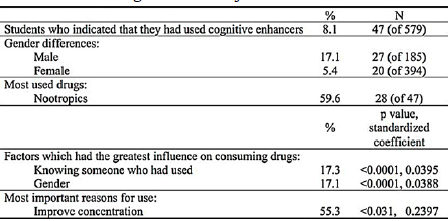
Table 1 Main findings of this study.
19th August 2024: digital purchasing is currently unavailable on Cambridge Core. Due to recent technical disruption affecting our publishing operation, we are experiencing some delays to publication. We are working hard to restore services as soon as possible and apologise for the inconvenience. For further updates please visit our website: https://www.cambridge.org/universitypress/about-us/news-and-blogs/cambridge-university-press-publishing-update-following-technical-disruption

Published online by Cambridge University Press: 23 March 2020
Use of prescription psychostimulants and nootropics for non-medical purpose is a growing trend, especially in academic environment. Seeing the risks of neuroenhancement we decided to investigate situation in Lithuania.
Analyze the use of cognitive enhancers among medical students in Lithuania.
1. Determine the prevalence of cognitive enhancement. 2. Figure out what drugs are mostly used and reasons for the usage. 3. Evaluate the contributing factors.
A cross-sectional survey study was performed in Vilnius University and Lithuanian University of Health Sciences. Students were asked to fill anonymous paper questionnaires consisting of 13 items concerning prevalence of substance use to enhance cognitive performance, reasons, and correlates during lecture time.
Results are summarized in Table 1. A total of 8.1% of responders indicated that they had used cognitive enhancers. Nootropics were the most frequently mentioned: 59.6%, while psychostimulants were mentioned less frequently: 38.3% (including modafinil, methylphenidate and amphetamine derived drugs), and 23.4% indicated other substances. Improvement of concentration and increased studying time were predominant purposes (55.3% and 48.9% of users). Male students reported 3 times higher prevalence rates than females (14.6% vs. 5.1%, P < 0.05). Prevalence were also higher in students, who knew someone using these substances as compared to those who did not (17.3% vs. 5.1%, P < 0.05); it was the most associated factor with cognitive-enhancing drug taking behavior (Table 1).
In Lithuania, 1 of 12 medical students admits to having used neuroenhancing drugs. Nootropics were the most used drugs. Knowing user was the most important factor for usage.
The authors have not supplied their declaration of competing interest.

Table 1 Main findings of this study.

Table 1 Main findings of this study.
Comments
No Comments have been published for this article.